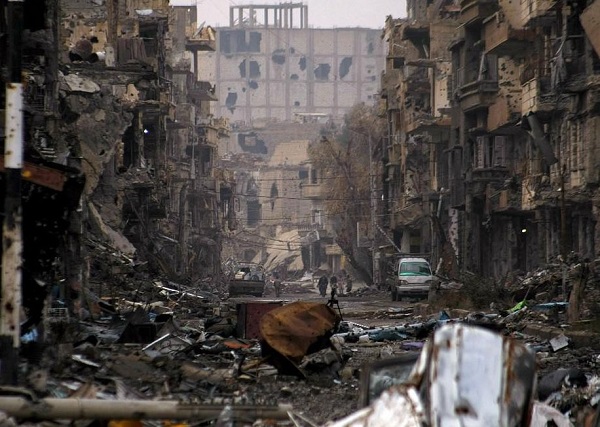Alwaght- Syria's northern city of Raqqa as the biggest ISIS-held city in the country has almost been cleansed of ISIS terrorist group as the Kurdish-led Syrian Democratic Forces advanced into the de facto capital of the self-proclaimed caliphate.
Ousting the terrorist group from Raqqa is another heavy blow to the ISIS that in past two years gradually retreated from the seized territories upon progression by the Syrian and Iraqi national armies. Raqqa was one of the first cities the ISIS captured in the 2014 sweeping offensives. After three years, the SDF, a coalition of predominantly Kurdish forces along with Arab militias, nearly four months ago encircled the city.
The SDF was launched in 2015, with focus on retaking from terrorists Raqqa and other Syrian regions held by ISIS. The Syrian Kurds account for the main part of the structure of command and forces of the SDF, giving the idea that control of the city means domination of Raqqa by the Syrian Kurds who over the past two years have been fighting against ISIS in tune with the central government. During this time, they operated under support of the US-led military coalition, including Pentagon air cover that considerably helped them make their way to the heart of the city.
On the other side, capture of Raqqa is so significant for the Kurdsand helps them realize some of their goals in north of the country. Raqqa is located next to the Kurdish northern line, which is presently divided into western and eastern parts. Kobani, a city in east of Euphrates River, and Afrin, city in Euphrates’s west, are held by Syrian Kurdish forces. However, Manbij, a city lying in between, is held by the Arab opposition militias loyal to and sponsored by the Turkish army. The Kurdish forces are hopeful that Raqqa seizure will serve their aim of connecting the two northern Kurdish cities.
But the Kurdish presence in Raqqa city will hardly go unchallenged. Without doubt the Kurdish governance of the province in the long run will be hit by serious obstacles. Arabs and non-Kurdish people account for a majority of the population of the city, now reduced to rubbles, which means the Kurdish forces will face enormous difficulties trying to hold the city under their control. Moreover, ISIS neutralization in the city does not mean that the now deeply-entrenched ISIS radical ideology among some of Raqqa residents will fade away this soon. The analysts maintain that very likely governing a city that was under occupation of ISIS, a group with marked barbarity, will hardly be possible.
Additionally, now that ISIS is defeated in Raqqa, there is possibility of the Kurds being stripped of the American military backing they have been receiving in the past two years. Even Washington can disarm them, something it pledged to Ankara leaders after they lashed out at the US for its help to the forces Turkey identifies its archenemies.
In past two years, the US support for the advancing Kurdish fighters in north provided justification for Turkey to grow concerns and protest. The Turkish leaders fear that American backup will result in establishment of a Kurdish state or at least an autonomous region on their southern borders.
Ankara repeatedly called on Washington to stop arming the Kurdish factions. This has been a top demand in many Syria-related speeches by the Turkish leaders. This was one of the four points of discussion between President Recep Tayyip Erdogan of Turkey and the US President Donald Trump during a phone call in January. But, the Americans have so far turned a deaf ear in practice to the Turkish calls. Addressing the Turkish concerns, the US Department of Defense said in late June that the Kurdish forces will be disarmed after ISIS is defeated in north, though.
Prime Minister Binali Yidrim of Turkey earlier in May noted that Washington assured Ankara that it will clear the Kurdish fighters of People’s Protection Units (YPG) from Raqqa after retaking in a bid to save its demographic makeup, signaling hard situation for the Kurds' stay after the city liberation. The comments came short after the White House announced plans to send semi-heavy weapons to the YPG combatants.
Regarding the Turkish pressures and American assurances of Kurdish forces' withdrawal, the Kurds cannot cultivate optimism about increased power or rising as an unchallenged force in post-ISIS Raqqa. Their hope for tightened grip on Raqqa in fact can be frustrated if the US decides to take arms from their hands, an arrangement likely now.
So, the US backing for the Kurdish forces in their push for Raqqa control is translated as going in service of the US– rather than the Kurds'- interests. In fact, behind its investment in Raqqa operation Washington seeks concocting its own play cards for easier bargaining and share taking in the Syrian future negotiations. Now that the central Syrian government is increasingly restoring stability to the country, and Moscow and Tehran, two staunch allies of Damascus, will take center stage and accentuate the Damascus authority in prospective peace talks, Washington's sole hope is territory control for any potential role which can be, unavoidably, so limited as Syrian battleground successes and more calm continue to unfold.



























